University Report: Globalisation and Free Trade's Impact on Business
VerifiedAdded on 2022/09/12
|6
|1444
|17
Report
AI Summary
This report investigates the multifaceted impact of globalisation and free trade on the contemporary business landscape. It commences by defining globalisation and free trade, elucidating their interconnectedness and significance in the international market. The report then presents a balanced analysis, offering evidence both supporting and opposing the benefits of globalisation and free trade, incorporating real-world examples like Starbucks and eBay. The analysis encompasses the influence of technology, communication, and travel on global business operations, as well as the advantages and disadvantages for businesses and economies. The report culminates in a conclusion that assesses the overall impact of globalisation and free trade, highlighting the need for sustainable practices to address the challenges and barriers associated with these processes. It emphasizes the importance of considering both the positive and negative consequences to create an inclusive and beneficial global environment.
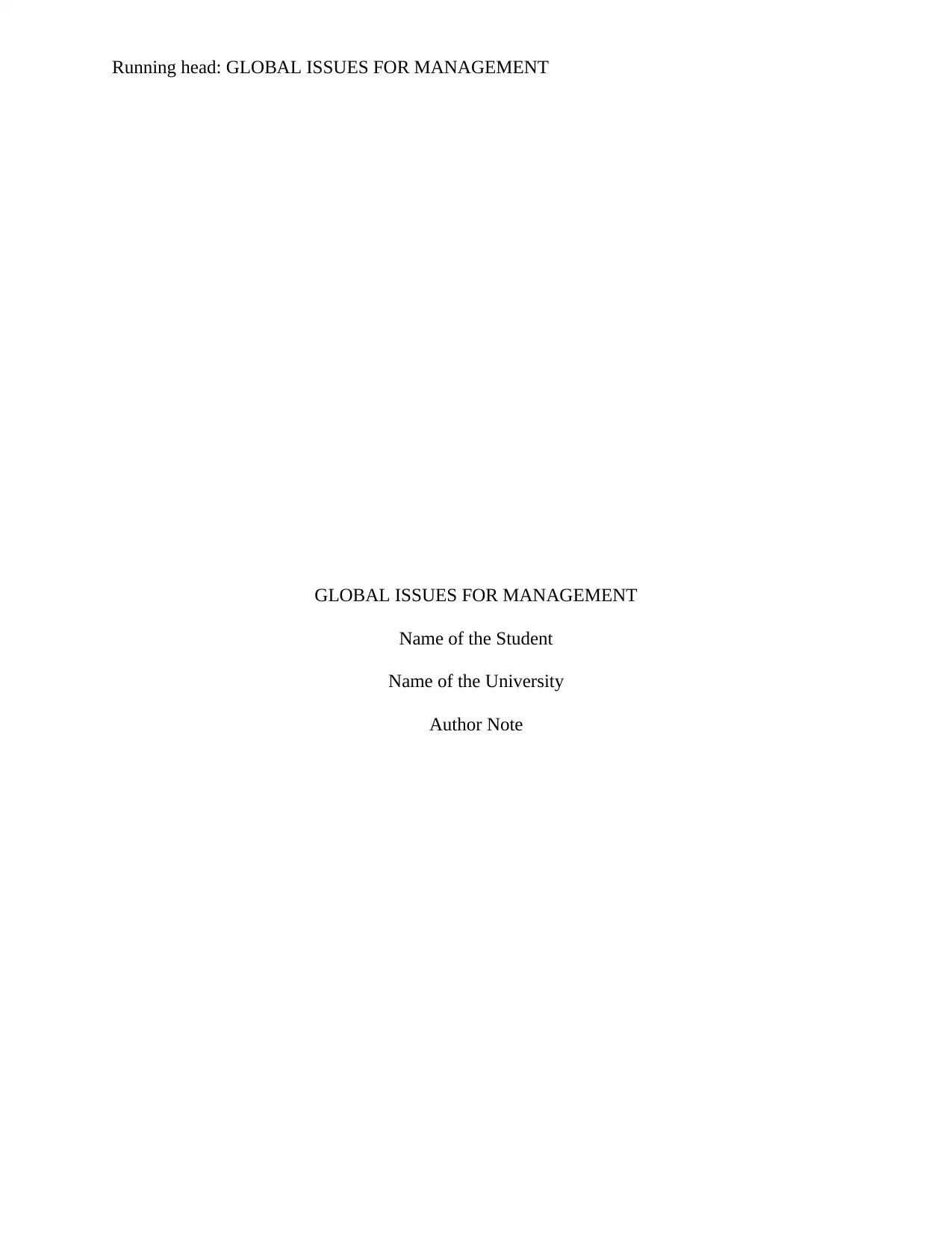
Running head: GLOBAL ISSUES FOR MANAGEMENT
GLOBAL ISSUES FOR MANAGEMENT
Name of the Student
Name of the University
Author Note
GLOBAL ISSUES FOR MANAGEMENT
Name of the Student
Name of the University
Author Note
Paraphrase This Document
Need a fresh take? Get an instant paraphrase of this document with our AI Paraphraser
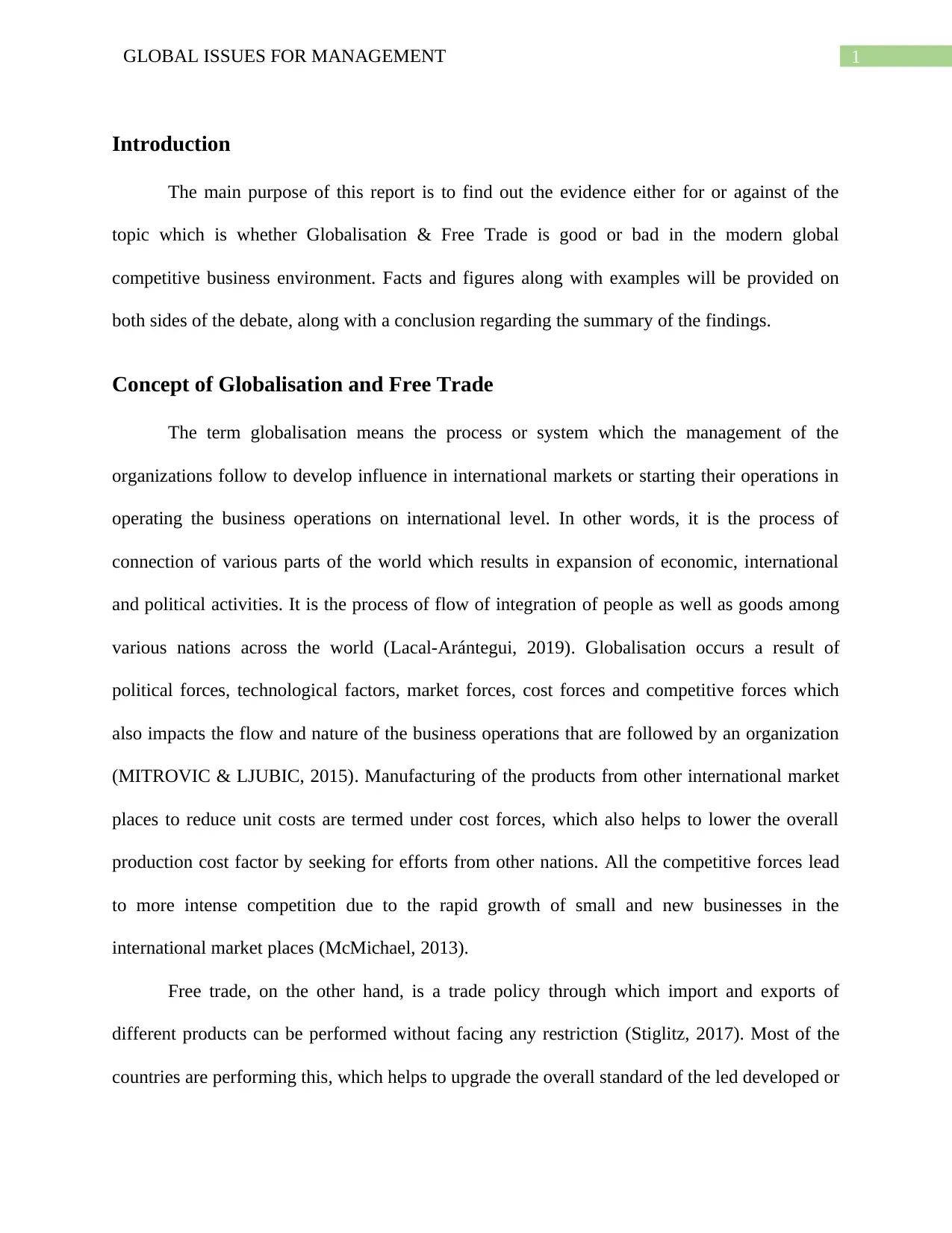
1GLOBAL ISSUES FOR MANAGEMENT
Introduction
The main purpose of this report is to find out the evidence either for or against of the
topic which is whether Globalisation & Free Trade is good or bad in the modern global
competitive business environment. Facts and figures along with examples will be provided on
both sides of the debate, along with a conclusion regarding the summary of the findings.
Concept of Globalisation and Free Trade
The term globalisation means the process or system which the management of the
organizations follow to develop influence in international markets or starting their operations in
operating the business operations on international level. In other words, it is the process of
connection of various parts of the world which results in expansion of economic, international
and political activities. It is the process of flow of integration of people as well as goods among
various nations across the world (Lacal-Arántegui, 2019). Globalisation occurs a result of
political forces, technological factors, market forces, cost forces and competitive forces which
also impacts the flow and nature of the business operations that are followed by an organization
(MITROVIC & LJUBIC, 2015). Manufacturing of the products from other international market
places to reduce unit costs are termed under cost forces, which also helps to lower the overall
production cost factor by seeking for efforts from other nations. All the competitive forces lead
to more intense competition due to the rapid growth of small and new businesses in the
international market places (McMichael, 2013).
Free trade, on the other hand, is a trade policy through which import and exports of
different products can be performed without facing any restriction (Stiglitz, 2017). Most of the
countries are performing this, which helps to upgrade the overall standard of the led developed or
Introduction
The main purpose of this report is to find out the evidence either for or against of the
topic which is whether Globalisation & Free Trade is good or bad in the modern global
competitive business environment. Facts and figures along with examples will be provided on
both sides of the debate, along with a conclusion regarding the summary of the findings.
Concept of Globalisation and Free Trade
The term globalisation means the process or system which the management of the
organizations follow to develop influence in international markets or starting their operations in
operating the business operations on international level. In other words, it is the process of
connection of various parts of the world which results in expansion of economic, international
and political activities. It is the process of flow of integration of people as well as goods among
various nations across the world (Lacal-Arántegui, 2019). Globalisation occurs a result of
political forces, technological factors, market forces, cost forces and competitive forces which
also impacts the flow and nature of the business operations that are followed by an organization
(MITROVIC & LJUBIC, 2015). Manufacturing of the products from other international market
places to reduce unit costs are termed under cost forces, which also helps to lower the overall
production cost factor by seeking for efforts from other nations. All the competitive forces lead
to more intense competition due to the rapid growth of small and new businesses in the
international market places (McMichael, 2013).
Free trade, on the other hand, is a trade policy through which import and exports of
different products can be performed without facing any restriction (Stiglitz, 2017). Most of the
countries are performing this, which helps to upgrade the overall standard of the led developed or
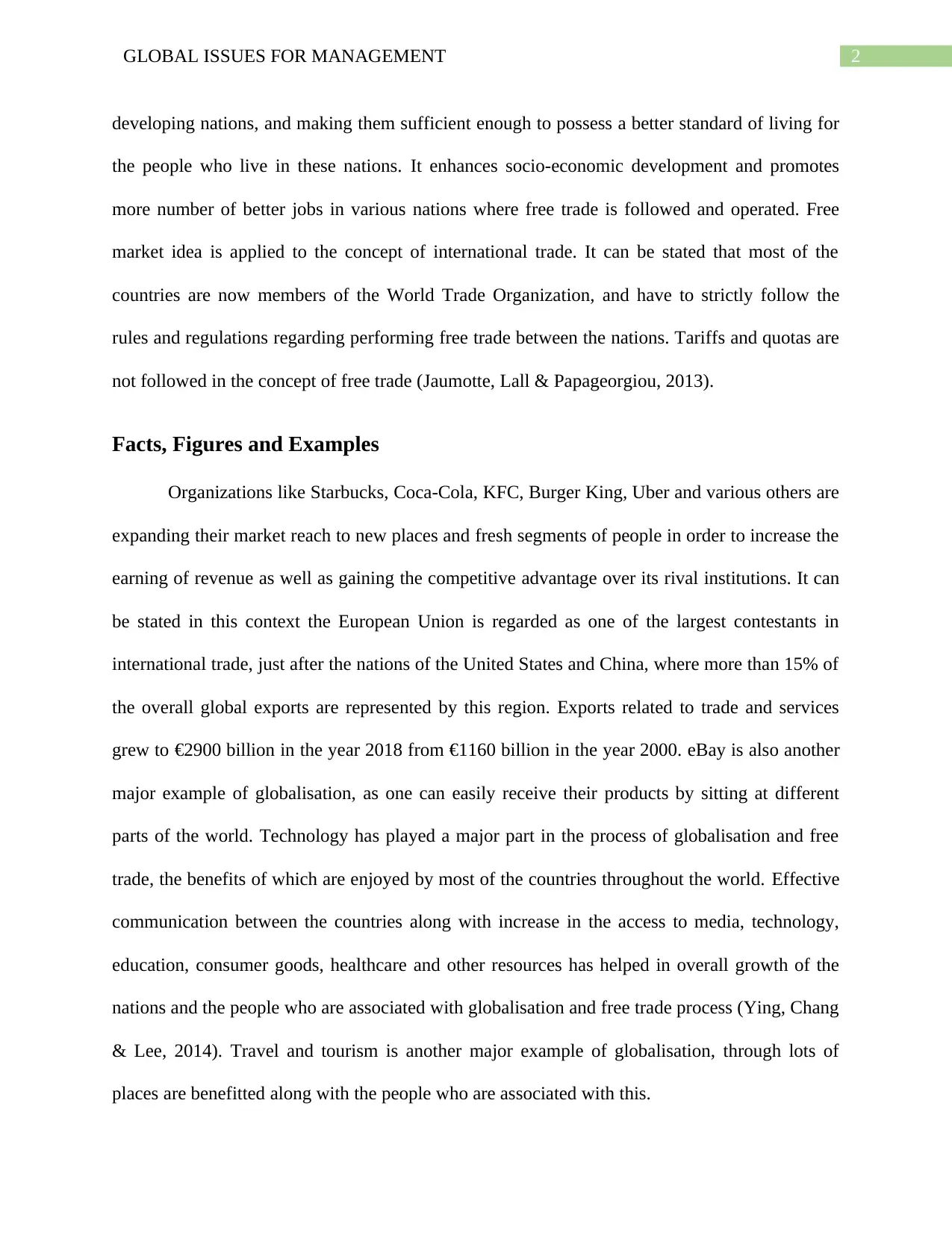
2GLOBAL ISSUES FOR MANAGEMENT
developing nations, and making them sufficient enough to possess a better standard of living for
the people who live in these nations. It enhances socio-economic development and promotes
more number of better jobs in various nations where free trade is followed and operated. Free
market idea is applied to the concept of international trade. It can be stated that most of the
countries are now members of the World Trade Organization, and have to strictly follow the
rules and regulations regarding performing free trade between the nations. Tariffs and quotas are
not followed in the concept of free trade (Jaumotte, Lall & Papageorgiou, 2013).
Facts, Figures and Examples
Organizations like Starbucks, Coca-Cola, KFC, Burger King, Uber and various others are
expanding their market reach to new places and fresh segments of people in order to increase the
earning of revenue as well as gaining the competitive advantage over its rival institutions. It can
be stated in this context the European Union is regarded as one of the largest contestants in
international trade, just after the nations of the United States and China, where more than 15% of
the overall global exports are represented by this region. Exports related to trade and services
grew to €2900 billion in the year 2018 from €1160 billion in the year 2000. eBay is also another
major example of globalisation, as one can easily receive their products by sitting at different
parts of the world. Technology has played a major part in the process of globalisation and free
trade, the benefits of which are enjoyed by most of the countries throughout the world. Effective
communication between the countries along with increase in the access to media, technology,
education, consumer goods, healthcare and other resources has helped in overall growth of the
nations and the people who are associated with globalisation and free trade process (Ying, Chang
& Lee, 2014). Travel and tourism is another major example of globalisation, through lots of
places are benefitted along with the people who are associated with this.
developing nations, and making them sufficient enough to possess a better standard of living for
the people who live in these nations. It enhances socio-economic development and promotes
more number of better jobs in various nations where free trade is followed and operated. Free
market idea is applied to the concept of international trade. It can be stated that most of the
countries are now members of the World Trade Organization, and have to strictly follow the
rules and regulations regarding performing free trade between the nations. Tariffs and quotas are
not followed in the concept of free trade (Jaumotte, Lall & Papageorgiou, 2013).
Facts, Figures and Examples
Organizations like Starbucks, Coca-Cola, KFC, Burger King, Uber and various others are
expanding their market reach to new places and fresh segments of people in order to increase the
earning of revenue as well as gaining the competitive advantage over its rival institutions. It can
be stated in this context the European Union is regarded as one of the largest contestants in
international trade, just after the nations of the United States and China, where more than 15% of
the overall global exports are represented by this region. Exports related to trade and services
grew to €2900 billion in the year 2018 from €1160 billion in the year 2000. eBay is also another
major example of globalisation, as one can easily receive their products by sitting at different
parts of the world. Technology has played a major part in the process of globalisation and free
trade, the benefits of which are enjoyed by most of the countries throughout the world. Effective
communication between the countries along with increase in the access to media, technology,
education, consumer goods, healthcare and other resources has helped in overall growth of the
nations and the people who are associated with globalisation and free trade process (Ying, Chang
& Lee, 2014). Travel and tourism is another major example of globalisation, through lots of
places are benefitted along with the people who are associated with this.
⊘ This is a preview!⊘
Do you want full access?
Subscribe today to unlock all pages.

Trusted by 1+ million students worldwide
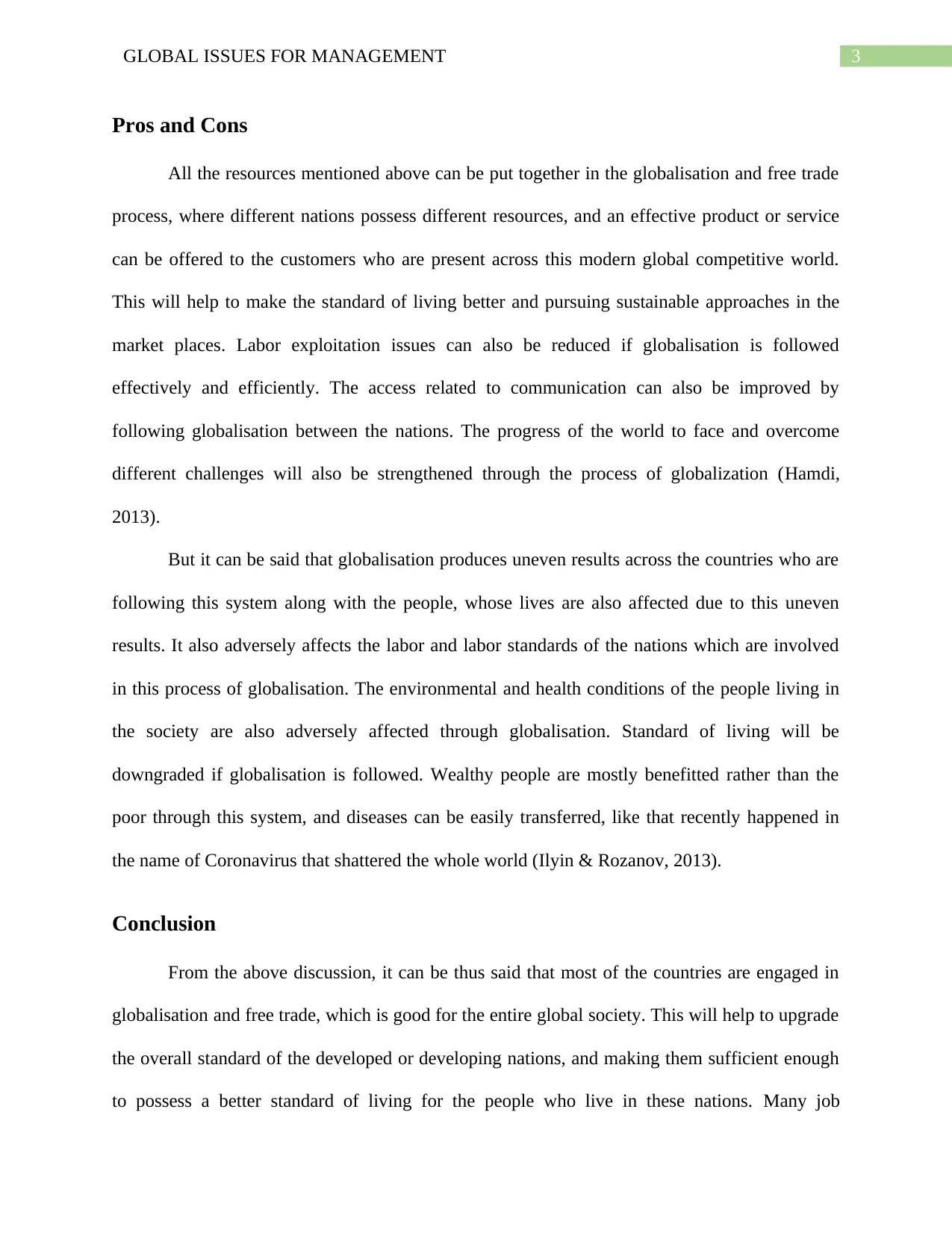
3GLOBAL ISSUES FOR MANAGEMENT
Pros and Cons
All the resources mentioned above can be put together in the globalisation and free trade
process, where different nations possess different resources, and an effective product or service
can be offered to the customers who are present across this modern global competitive world.
This will help to make the standard of living better and pursuing sustainable approaches in the
market places. Labor exploitation issues can also be reduced if globalisation is followed
effectively and efficiently. The access related to communication can also be improved by
following globalisation between the nations. The progress of the world to face and overcome
different challenges will also be strengthened through the process of globalization (Hamdi,
2013).
But it can be said that globalisation produces uneven results across the countries who are
following this system along with the people, whose lives are also affected due to this uneven
results. It also adversely affects the labor and labor standards of the nations which are involved
in this process of globalisation. The environmental and health conditions of the people living in
the society are also adversely affected through globalisation. Standard of living will be
downgraded if globalisation is followed. Wealthy people are mostly benefitted rather than the
poor through this system, and diseases can be easily transferred, like that recently happened in
the name of Coronavirus that shattered the whole world (Ilyin & Rozanov, 2013).
Conclusion
From the above discussion, it can be thus said that most of the countries are engaged in
globalisation and free trade, which is good for the entire global society. This will help to upgrade
the overall standard of the developed or developing nations, and making them sufficient enough
to possess a better standard of living for the people who live in these nations. Many job
Pros and Cons
All the resources mentioned above can be put together in the globalisation and free trade
process, where different nations possess different resources, and an effective product or service
can be offered to the customers who are present across this modern global competitive world.
This will help to make the standard of living better and pursuing sustainable approaches in the
market places. Labor exploitation issues can also be reduced if globalisation is followed
effectively and efficiently. The access related to communication can also be improved by
following globalisation between the nations. The progress of the world to face and overcome
different challenges will also be strengthened through the process of globalization (Hamdi,
2013).
But it can be said that globalisation produces uneven results across the countries who are
following this system along with the people, whose lives are also affected due to this uneven
results. It also adversely affects the labor and labor standards of the nations which are involved
in this process of globalisation. The environmental and health conditions of the people living in
the society are also adversely affected through globalisation. Standard of living will be
downgraded if globalisation is followed. Wealthy people are mostly benefitted rather than the
poor through this system, and diseases can be easily transferred, like that recently happened in
the name of Coronavirus that shattered the whole world (Ilyin & Rozanov, 2013).
Conclusion
From the above discussion, it can be thus said that most of the countries are engaged in
globalisation and free trade, which is good for the entire global society. This will help to upgrade
the overall standard of the developed or developing nations, and making them sufficient enough
to possess a better standard of living for the people who live in these nations. Many job
Paraphrase This Document
Need a fresh take? Get an instant paraphrase of this document with our AI Paraphraser
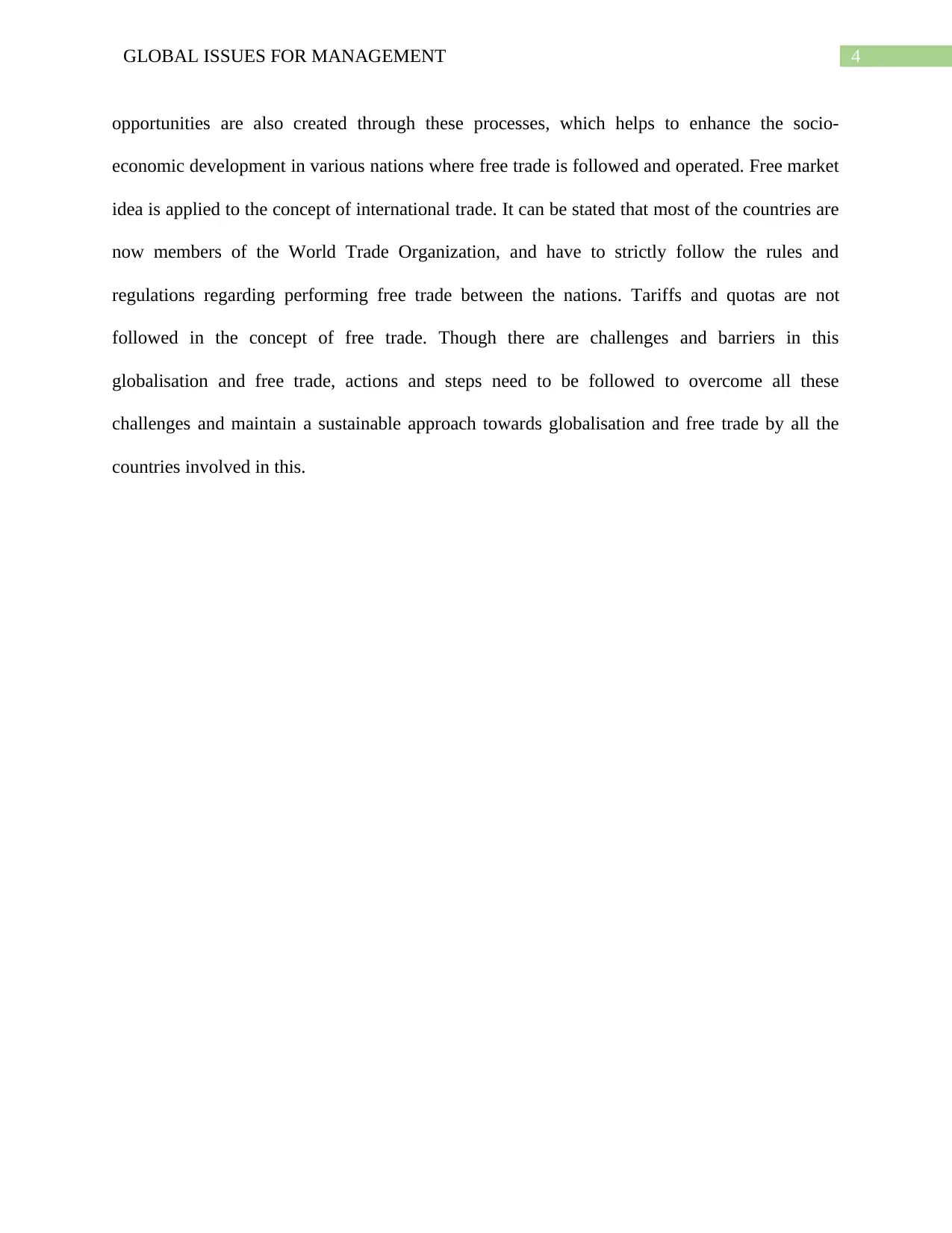
4GLOBAL ISSUES FOR MANAGEMENT
opportunities are also created through these processes, which helps to enhance the socio-
economic development in various nations where free trade is followed and operated. Free market
idea is applied to the concept of international trade. It can be stated that most of the countries are
now members of the World Trade Organization, and have to strictly follow the rules and
regulations regarding performing free trade between the nations. Tariffs and quotas are not
followed in the concept of free trade. Though there are challenges and barriers in this
globalisation and free trade, actions and steps need to be followed to overcome all these
challenges and maintain a sustainable approach towards globalisation and free trade by all the
countries involved in this.
opportunities are also created through these processes, which helps to enhance the socio-
economic development in various nations where free trade is followed and operated. Free market
idea is applied to the concept of international trade. It can be stated that most of the countries are
now members of the World Trade Organization, and have to strictly follow the rules and
regulations regarding performing free trade between the nations. Tariffs and quotas are not
followed in the concept of free trade. Though there are challenges and barriers in this
globalisation and free trade, actions and steps need to be followed to overcome all these
challenges and maintain a sustainable approach towards globalisation and free trade by all the
countries involved in this.
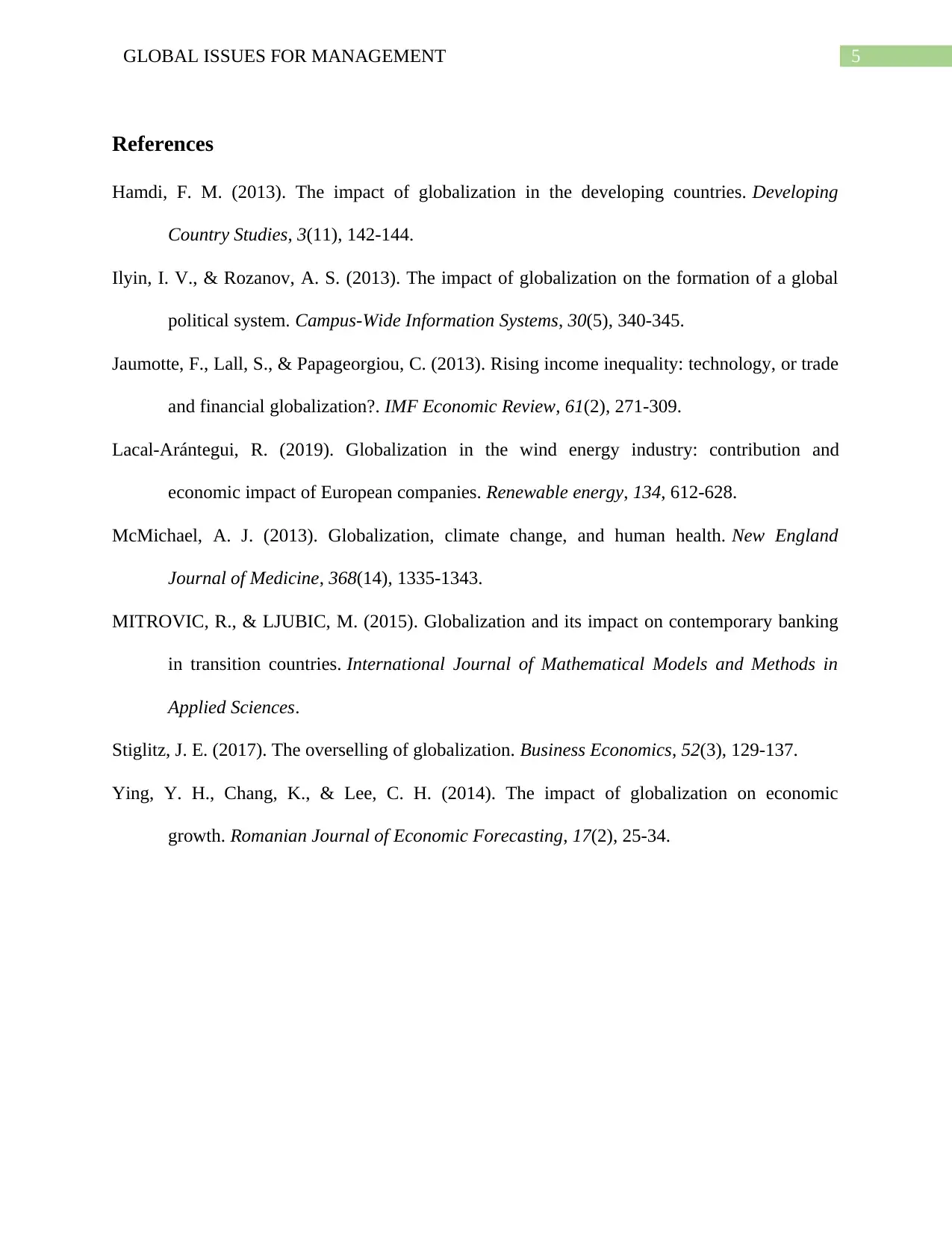
5GLOBAL ISSUES FOR MANAGEMENT
References
Hamdi, F. M. (2013). The impact of globalization in the developing countries. Developing
Country Studies, 3(11), 142-144.
Ilyin, I. V., & Rozanov, A. S. (2013). The impact of globalization on the formation of a global
political system. Campus-Wide Information Systems, 30(5), 340-345.
Jaumotte, F., Lall, S., & Papageorgiou, C. (2013). Rising income inequality: technology, or trade
and financial globalization?. IMF Economic Review, 61(2), 271-309.
Lacal-Arántegui, R. (2019). Globalization in the wind energy industry: contribution and
economic impact of European companies. Renewable energy, 134, 612-628.
McMichael, A. J. (2013). Globalization, climate change, and human health. New England
Journal of Medicine, 368(14), 1335-1343.
MITROVIC, R., & LJUBIC, M. (2015). Globalization and its impact on contemporary banking
in transition countries. International Journal of Mathematical Models and Methods in
Applied Sciences.
Stiglitz, J. E. (2017). The overselling of globalization. Business Economics, 52(3), 129-137.
Ying, Y. H., Chang, K., & Lee, C. H. (2014). The impact of globalization on economic
growth. Romanian Journal of Economic Forecasting, 17(2), 25-34.
References
Hamdi, F. M. (2013). The impact of globalization in the developing countries. Developing
Country Studies, 3(11), 142-144.
Ilyin, I. V., & Rozanov, A. S. (2013). The impact of globalization on the formation of a global
political system. Campus-Wide Information Systems, 30(5), 340-345.
Jaumotte, F., Lall, S., & Papageorgiou, C. (2013). Rising income inequality: technology, or trade
and financial globalization?. IMF Economic Review, 61(2), 271-309.
Lacal-Arántegui, R. (2019). Globalization in the wind energy industry: contribution and
economic impact of European companies. Renewable energy, 134, 612-628.
McMichael, A. J. (2013). Globalization, climate change, and human health. New England
Journal of Medicine, 368(14), 1335-1343.
MITROVIC, R., & LJUBIC, M. (2015). Globalization and its impact on contemporary banking
in transition countries. International Journal of Mathematical Models and Methods in
Applied Sciences.
Stiglitz, J. E. (2017). The overselling of globalization. Business Economics, 52(3), 129-137.
Ying, Y. H., Chang, K., & Lee, C. H. (2014). The impact of globalization on economic
growth. Romanian Journal of Economic Forecasting, 17(2), 25-34.
⊘ This is a preview!⊘
Do you want full access?
Subscribe today to unlock all pages.

Trusted by 1+ million students worldwide
1 out of 6
Related Documents
Your All-in-One AI-Powered Toolkit for Academic Success.
+13062052269
info@desklib.com
Available 24*7 on WhatsApp / Email
![[object Object]](/_next/static/media/star-bottom.7253800d.svg)
Unlock your academic potential
Copyright © 2020–2025 A2Z Services. All Rights Reserved. Developed and managed by ZUCOL.





